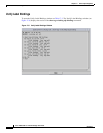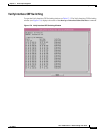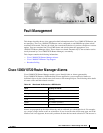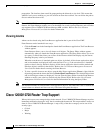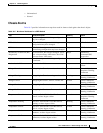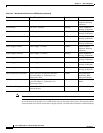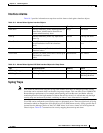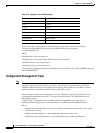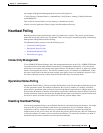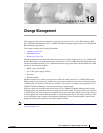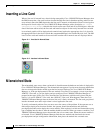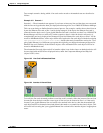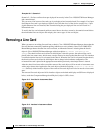
18-6
Cisco 12000/10700 v3.1.1 Router Manager User Guide
OL-4455-01
Chapter 18 Fault Management
Cisco 12000/10720 Router Trap Support
Syslog alarms have a Description in the Event Browser application in the following format:
“Asserted [<clogHistMsgText>] by facility [<clogHistFacility>], Message name
[<clogHistMsgName>]”
Where:
clogHistMsgText is the message text
clogHistFacility is the facility name (where the message came from)
clogHistMsgName is the message name
An example Syslog Alarm Description is
“Asserted [Critical/high priority process ATM Periodic may not dismiss.] by facility [SCHED], Message
name [EDISMSCRIT]”
Configuration Management Traps
Note Care should be taken when using the Configuration Management alarm feature since there are
possibilities which can result in large trap volumes This can affect the performance of the Cisco
12000/10720 Router Manager (for example, when opening an Event Browser) and hinder effective
monitoring because of the high numbers of alarms that will be raised.
When a change is made to the configuration of a Cisco 12000 Series Router, Cisco IOS can send a
“configuration management event trap”. This trap is translated into a Cisco EMF alarm with the
following description:
“Config Change, Command Source: <ccmHistoryEventCommandSource>, Config Source: <
ccmHistoryEventConfigSource>, Config Destination: <ccmHistoryEventConfigDestination>”
Where:
• cmHistoryEventCommandSource is the source of the command that instigated the event – either
command line or snmp.
• cmHistoryEventConfigSource is the configuration data source for the event.
• ccmHistoryEventConfigDestination is the configuration data destination for the event.
Table 18-5 Syslog to Cisco EMF Mappings
Trap Alarm Description
Emergency Critical
Alert Critical
Critical Critical
Error Major
Warning Minor
Notification Minor
Informational Informational
Debug Informational



